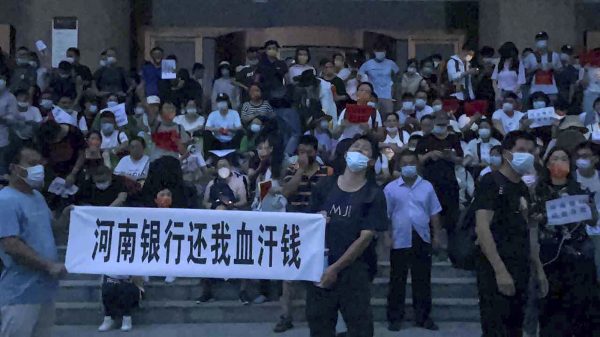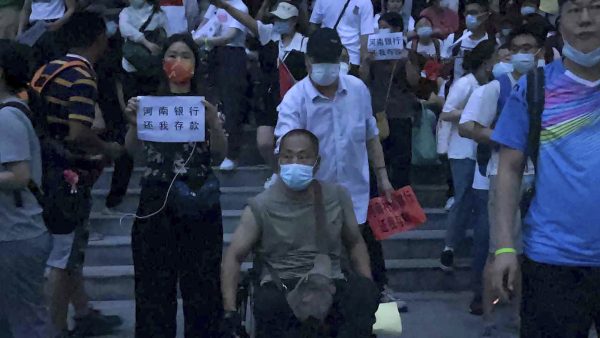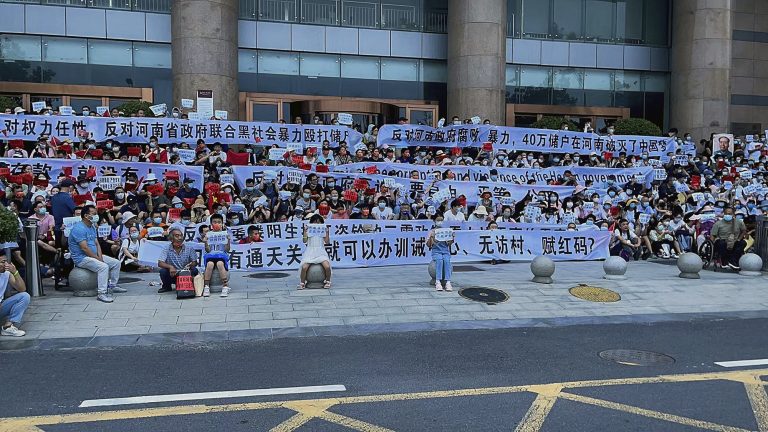Droves of angry protesters took to the streets in China’s Henan Province on July 10 after their bank accounts were frozen overnight without explanation.
The incident has fueled a public outcry as desperate customers demand answers from the banking institutions located in Zhengzhou, the provincial capital. The four banks in question have frozen all cash withdrawals since mid-April — leaving thousands of customers without access to their life savings.
The protesters are among thousands of customers who opened accounts at the banks in Henan and neighboring Anhui Province that offered relatively high interest rates. However, the bank depositors later found out that they could not make withdrawals after state media reports revealed that the head of the banks’ parent company was being prosecuted for tax evasion, fraud and other financial crimes.

Experts have described the Zhengzhou banking crisis as another example of China’s struggling economy amid unrelenting “zero-COVID” policies, prolonged lockdowns and movement curbs that have resulted in massive supply chain disruptions and impacted consumer spending.
MORE ON CHINA’S ECONOMY:
- China Experiencing Worst Capital Flight in 7 Years, Manufacturers Also Hit Hard
- Hongkongers Fear Tightening Regime Control as Officials Promote Mainland-style ‘Health Codes’
- China Fights Uphill Battle to Rescue Its Economy While Keeping ‘Zero-COVID’
- Xi Tightens Grip Over Chinese Propaganda Ahead of Key Conclaves
“We came today and wanted to get our savings back, because I have elderly people and children at home, and the inability to withdraw savings has seriously affected my life,” a woman surnamed Zhang from the adjacent province of Shandong said in an interview with CNBC.
Success
You are now signed up for our newsletter
Success
Check your email to complete sign up
The protesters assembled before dawn on July 10 in front of the People’s Bank of China (PBoC) building in Zhengzhou. Flashing lights emitting from police vehicles could be seen even in the hazy morning light, Zhang said, adding that by 8 a.m, the entire street had been closed off and dozens of police officers had arrived at the scene.
She said that police then announced from a vehicle with a megaphone that the protesters were breaking the law by “illegally assembling,” and would be arrested if they didn’t leave. Around 10 a.m, men in T-shirts rushed the crowd and dispersed them. Zhang added that she witnessed women and elderly people being dragged down the stairs of the bank entrance and being violently shoved into unmarked buses and police vehicles.
Zhang herself was hit, and said she asked the officer, “Why did you hit me?”, to which he responded, “What’s wrong with beating you?”
Protesters were “hit, wounded and were bleeding from the head. Disabled people were also violently beaten,” one participant told the Associated Foreign Press (AFP), estimating the number of demonstrators to have been “at least several thousand.”

“We came all the way to Zhengzhou to get our money back, and we didn’t want to have conflicts with anyone,” Feng Tianyu, 31, who resides in the northern city of Harbin told The New York Times. “But the government sent so many people to deal with the unarmed people. We were cheated financially, beaten physically and traumatized mentally.”
Ms. Feng, who is two months pregnant, said authorities dressed in unmarked shirts pulled her by her hair and arms onto a bus. She said she was eventually taken to a hospital for stomach pains, but was refused admission due to the country’s ongoing COVID protocols.
Life savings gone up in smoke
Though the PBoC — China’s central bank — guarantees deposits of customers up to 500,000 yuan ($74,000), that won’t be enough to cover some peoples’ losses.
“This does not actually solve the problem,” said Xu Zhihao, another bank customer who didn’t take part in the violent protests.
One protester, who only gave her surname, Ding, said she and her mother had 800,000 yuan (about $119,000) in savings deposits across multiple banks in Zhengzhou.
“They made this announcement because we put our lives on the line. This less than 50,000 yuan isn’t what we are owed. It’s more a payment to keep social stability,” Mrs. Ding said.
She said that both she and her husband were struck by plainclothes security staff during the protest, and told AP that she also saw several people walking away with bleeding injuries.
After the July 10 protests took place — the largest group demonstration so far — Henan banking regulators posted a short notice on their website stating that authorities were in the process of “speeding up the verification of customer funds in four of the banks” and are working on formulating a plan that would resolve the situation and help protect the rights and interests of the public.
Oppression disguised as virus controls
Meanwhile, China’s central government has threatened to arrest anyone who takes part in future protests under charges of “picking quarrels and inciting chaos,” and have even utilized a COVID-19 tracking app to prevent crowds from gathering by turning their health status into “red”.
In efforts to keep track of every citizen’s health status, every resident in China is currently required to have a mobile phone reflecting their COVID status.
People with green health codes are allowed to travel freely. Those with yellow or red codes are not allowed to visit public places such as supermarkets, gyms, hotels, restaurants, and so on. The affected individual has to then report all close contacts to health authorities, undergo quarantine and several nucleic acid tests before they can be cleared and given a green status again.
Many protesters who set out for Zhengzhou to demand action from banking regulators found that their health status on the app had turned red — preventing them from traveling and risking arrest for breaking COVID protocols. Some even reported being questioned by police officers after checking into their hotels about why they had come to the city.
The Associated Press contributed to this report.














